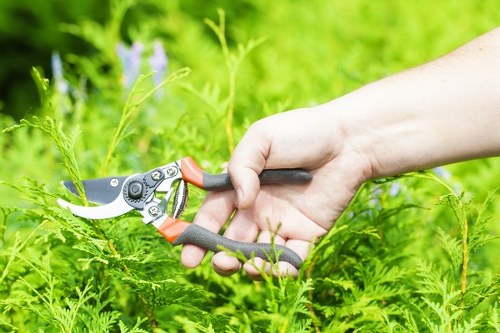Lawn Mowing Orpington: Your Comprehensive Guide to a Perfect Lawn

Maintaining a beautiful lawn in Orpington requires more than just occasional mowing. Whether you’re a homeowner looking to enhance your outdoor space or a business owner aiming for curb appeal, understanding the nuances of lawn mowing in Orpington is essential.
Orpington, with its lush greenery and temperate climate, provides an ideal environment for a thriving lawn. However, achieving and maintaining that perfect green space involves knowledge, effort, and the right tools.
In this guide, we’ll explore everything you need to know about lawn mowing in Orpington, including best practices, seasonal tips, and the benefits of professional lawn care services.
The Importance of Regular Lawn Mowing

Regular lawn mowing is a fundamental aspect of lawn care that contributes to the overall health and appearance of your grass. Here’s why it’s so important:
- Promotes Healthy Growth: Regular mowing encourages grass to grow thicker and healthier by removing only the top portion of the blades.
- Prevents Weeds: Keeping your grass at an optimal height reduces the chances of weeds taking hold and spreading.
- Enhances Curb Appeal: A well-mowed lawn significantly boosts the aesthetic value of your property.
- Reduces Pests: Shorter grass can help deter pests that thrive in tall, dense lawn areas.
Choosing the Right Mowing Height

Selecting the appropriate mowing height is crucial for maintaining a healthy lawn. Different grass types and seasons may require adjustments in mowing height.
General Guidelines:
- Cool-Season Grasses: Maintain a height of 2.5 to 3.5 inches during the growing season.
- Warm-Season Grasses: Aim for a height of 1.5 to 2.5 inches.
- Seasonal Adjustments: Raise the mower height in summer to provide shade for the roots and lower it in spring and autumn for better air circulation.
Best Practices for Lawn Mowing in Orpington

Implementing best practices ensures your lawn remains healthy and visually appealing throughout the year. Here are some tips tailored for Orpington’s climate:
1. Mow When the Grass is Dry: Wet grass can clump and lead to uneven cutting. Wait for the grass to dry before mowing.
2. Keep Your Mower Blades Sharp: Dull blades tear the grass, making it more susceptible to diseases. Sharpen your mower blades regularly.
3. Change Mowing Patterns: Vary your mowing direction each time you mow to prevent the grass from leaning in one direction and to promote even growth.
Seasonal Lawn Care Tips

Different seasons require different lawn care strategies to keep your grass healthy and vibrant.
- Spring: Remove debris, aerate the soil, and apply fertilizer to promote new growth.
- Summer: Water deeply and less frequently to encourage deep root growth, and mow at a higher height to protect against heat stress.
- Autumn: Rake leaves regularly, overseed bare patches, and prepare your lawn for the colder months.
- Winter: Minimize foot traffic on the grass and clear snow and ice promptly to prevent damage.
Benefits of Professional Lawn Mowing Services

While DIY lawn mowing can be cost-effective, hiring professional services in Orpington offers numerous advantages:
Expertise: Professionals have the knowledge and experience to diagnose and treat lawn issues effectively.
Time-Saving: Outsourcing lawn care frees up your time for other activities.
Quality Equipment: Professionals use high-quality mowing equipment, ensuring a precise and clean cut every time.
Choosing the Right Lawn Mowing Service

Selecting a reputable lawn mowing service in Orpington involves considering several factors:
- Reputation: Look for reviews and testimonials from satisfied customers.
- Services Offered: Ensure the company provides the specific services you need, such as edging, trimming, and fertilizing.
- Pricing: Compare quotes from different providers to find a service that fits your budget.
- Experience: Choose a company with a proven track record in lawn care.
Essential Tools for Lawn Mowing

Having the right tools can make lawn mowing easier and more efficient. Here are some essential tools for maintaining your Orpington lawn:
- Lawn Mower: Whether you choose a push mower, electric mower, or a ride-on mower, ensure it suits your lawn size and terrain.
- String Trimmer: For trimming edges and hard-to-reach areas.
- Lawn Edger: To create clean boundaries between your lawn and pathways.
- Rake: To remove leaves and debris before mowing.
- Mulch or Bagging System: Depending on your preference for grass clippings.
Maintenance Tips for Your Lawn Mowing Equipment

Proper maintenance of your lawn mowing equipment extends its lifespan and ensures optimal performance:
- Regular Cleaning: Remove grass clippings and debris after each use.
- Blade Sharpening: Sharpen mower blades at least once a season.
- Oil Changes: For gas-powered mowers, change the oil as recommended by the manufacturer.
- Battery Care: For electric mowers, maintain the battery by charging it properly and storing it in a cool, dry place.
- Storage: Store your mower in a dry place to prevent rust and damage.
Local Relevance: Lawn Mowing in Nearby Areas

Orpington is surrounded by several neighborhoods, each with its unique characteristics that influence lawn care and mowing practices. Here are some of the closest areas to Orpington and what makes lawn mowing in these areas unique:
- Park Langley: Known for its spacious gardens, Park Langley requires regular mowing to maintain its lush landscape.
- Wrotham: With its hilly terrain, lawn mowing in Wrotham often involves tackling slopes and uneven ground.
- St Mary Cray This area features a mix of traditional and modern gardens, necessitating varied mowing techniques.
- Kent Cross: An urban area within Orpington, Kent Cross benefits from compact lawn spaces that require precise mowing.
- Elmstead Wood: Surrounded by woodland, Elmstead Wood lawns benefit from shaded areas that impact grass growth and mowing schedules.
- Crayford Proximity to the River Cray means lawns in Crayford need regular maintenance to manage moisture levels.
- Petts Wood This residential area has a mix of small and large lawns, each needing tailored mowing approaches.
- Bestswood: Bestswood’s community gardens and green spaces require coordinated mowing efforts for a unified appearance.
- Green Street Green: With its modern housing, Green Street Green lawns often feature contemporary landscaping that requires specific mowing patterns.
- Orpington Hale: Known for its older estates, Orpington Hale lawns often feature traditional grass types that need specialized care.
- Kent Downs: The hilly landscapes of Kent Downs demand robust lawn mowing equipment and techniques.
- Ruxley Ruxley’s expansive lawns are perfect for professional mowing services that can handle large areas efficiently.
- Copers Covert: This area’s mixed-use developments require both residential and commercial lawn mowing services.
- Haysden Green: With its tight-knit community gardens, Haysden Green benefits from regular and communal lawn mowing practices.
- seby Heath: The rural aspects of Seby Heath require lawn mowing services that can manage both lawns and surrounding greenery.
Eco-Friendly Lawn Mowing Practices

Adopting eco-friendly practices not only benefits the environment but also promotes a healthier lawn. Here are some sustainable lawn mowing tips:
- Mow Less Frequently: Letting grass grow slightly longer can reduce the need for frequent mowing and improve drought resistance.
- Use a Mulching Mower: Mulching returns nutrients to the soil, reducing the need for additional fertilizers.
- Grasscycling: Leaving grass clippings on the lawn acts as a natural fertilizer and conserves moisture.
- Electric Mowers: Opt for electric or battery-powered mowers to reduce carbon emissions.
- Solar-Powered Equipment: Utilize solar-powered tools when possible to minimize environmental impact.
Water Conservation Techniques

Water conservation is vital for maintaining a sustainable lawn. Implement these techniques to use water efficiently:
- Irrigate Early: Watering in the early morning reduces evaporation and ensures the grass absorbs the moisture effectively.
- Deep Watering: Water deeply but less frequently to encourage deep root growth.
- Rain Sensors: Install rain sensors to prevent overwatering during rainfall.
- Soil Health: Improve soil quality with organic matter to enhance water retention.
- Native Grass: Plant native grass varieties that are adapted to the local climate and require less water.
Common Lawn Problems and Solutions

Every lawn faces challenges, but with the right approach, you can overcome them. Here are some common lawn problems in Orpington and how to address them:
- Weed Infestation: Use pre-emergent herbicides and manual removal to keep weeds at bay.
- Grub Damage: Apply beneficial nematodes or grub-resistant grass varieties to prevent grub infestations.
- Fungal Diseases: Ensure proper lawn aeration and avoid overwatering to reduce the risk of fungal growth.
- Brown Patches: Diagnose the cause, whether it’s pests, disease, or environmental stress, and apply appropriate treatments.
- Thatch Buildup: Dethatch your lawn periodically to promote healthy grass growth.
Organic Lawn Care Options

Choosing organic lawn care methods supports a healthier environment and promotes sustainable lawn maintenance:
- Organic Fertilizers: Use compost or natural fertilizers to nourish your lawn without harmful chemicals.
- Natural Pest Control: Employ companion planting or natural predators to manage pests.
- Biodegradable Products: Select biodegradable mulch and other lawn care products to minimize environmental impact.
- Manual Weed Removal: Hand-pulling weeds helps maintain a chemical-free lawn.
- Rainwater Harvesting: Collect rainwater for lawn irrigation to reduce reliance on treated water.
Benefits of a Well-Maintained Lawn

A well-maintained lawn offers numerous benefits beyond aesthetic appeal:
- Health: Green lawns can improve air quality by absorbing carbon dioxide and releasing oxygen.
- Recreation: A lush lawn provides a perfect space for outdoor activities and relaxation.
- Property Value: Attractive lawns can increase the value of your property.
- Community Appeal: Well-kept lawns contribute to the overall beauty and appeal of the neighborhood.
- Environmental Benefits: Healthy lawns can prevent soil erosion and support local biodiversity.
Enhancing Your Lawn’s Aesthetic

Enhancing the aesthetic appeal of your lawn can transform your outdoor space. Consider these tips:
- Consistent Mowing: Regular and even mowing promotes a uniform appearance.
- Edging and Trimming: Define the boundaries of your lawn with precise edging and trimming.
- Seasonal Flowers: Plant seasonal flowers to add color and vibrancy to your lawn.
- Pathways and Borders: Incorporate pathways and borders to create structured and visually appealing areas.
- Ornamental Features: Add features like birdbaths, benches, or sculptures to personalize your lawn.
Technology in Lawn Mowing

The advancement of technology has revolutionized lawn mowing, making it more efficient and user-friendly:
- Robotic Mowers: Automated mowers can maintain your lawn with minimal intervention, saving time and effort.
- Smart Mowers: Mowers with GPS and connectivity features allow for precise control and scheduling via smartphone apps.
- Battery-Powered Mowers: These eco-friendly mowers offer quiet operation and are easy to maintain.
- GPS Mapping: Advanced mowers use GPS mapping to navigate complex lawn layouts accurately.
- Eco Modes: Many modern mowers come with eco modes that optimize energy use and reduce environmental impact.
Choosing the Right Technology for Your Lawn

Selecting the appropriate technology depends on your lawn size, budget, and personal preferences:
- Robotic Mowers: Ideal for small to medium-sized lawns and those looking for a hands-off mowing solution.
- Smart Mowers: Suitable for tech-savvy homeowners who want control over mowing schedules and patterns.
- Battery-Powered Mowers: Perfect for eco-conscious users seeking a quiet and efficient mowing experience.
Preparing Your Lawn for Winter

Winter preparation is essential for protecting your lawn during the colder months. Follow these steps to ensure your lawn remains healthy:
- Final Mowing: Mow your lawn to a slightly lower height, but avoid cutting it too short to prevent stress from cold temperatures.
- Remove Debris: Clear fallen leaves and branches to prevent mold and maintain airflow.
- Fertilization: Apply a winter fertilizer to provide essential nutrients that help the grass survive the winter.
- Aeration: Aerate your lawn to improve soil structure and reduce compaction.
- Seeding: Overseed bare areas to promote new growth in the spring.
Protecting Your Lawn from Frost

Frost can damage your lawn, but these tips can help minimize its impact:
- Water Before Frost: Moist soil retains heat better than dry soil, offering some protection against frost.
- Use Frost Blankets: Cover vulnerable areas with frost blankets to shield them from extreme cold.
- Maintain Proper Mowing Height: Keeping grass slightly longer can provide natural insulation against frost.
- Avoid Foot Traffic: Reduce walking on your lawn during frosty conditions to prevent damage.
- Monitor Weather Forecasts: Stay informed about upcoming frosts and take preventive measures accordingly.
Final Thoughts on Lawn Mowing in Orpington

Maintaining a beautiful lawn in Orpington involves a combination of regular mowing, proper maintenance, and adopting best practices tailored to the local climate and conditions. Whether you choose to handle lawn care yourself or hire professional services, understanding the essential aspects of lawn mowing is key to achieving a lush and healthy outdoor space.
By following the tips and guidelines outlined in this article, you can ensure your lawn remains vibrant and welcoming throughout the year.
Investing time and effort into lawn care not only enhances the beauty of your property but also contributes to a healthier and more enjoyable environment for you and your community.
Frequently Asked Questions

1. How often should I mow my lawn in Orpington?
Generally, mowing once a week during the growing season is recommended. However, this can vary based on grass type, weather conditions, and lawn growth rate.
2. What is the best time of day to mow the lawn?
The best time to mow is in the late morning after the dew has dried but before the afternoon heat sets in. This helps the grass recover quickly from mowing.
3. Should I bag my grass clippings or leave them on the lawn?
Leaving grass clippings, also known as grasscycling, can provide natural fertilization and retain moisture. However, if the clippings are too long or thick, it may be beneficial to bag them.
4. What type of mower is best for a medium-sized Orpington lawn?
A push mower or a self-propelled mower is typically suitable for medium-sized lawns. For larger areas, a ride-on mower or robotic mower might be more efficient.
5. How can I prevent my lawn from developing brown patches?
Ensure consistent watering, avoid over-fertilizing, mow at the correct height, and address any pest or disease issues promptly to prevent brown patches from developing.